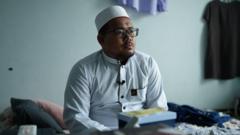Dong Yuyu, a well-known Chinese journalist, has been sentenced to seven years in prison for espionage after his 2022 arrest during a lunch with a Japanese diplomat. His conviction has sparked outrage among rights groups and his family, who see the case as an attack on the freedom of the press and diplomatic relations.
Journey from Journalist to Convict: Dong Yuyu's Seven-Year Sentence

Journey from Journalist to Convict: Dong Yuyu's Seven-Year Sentence
Dong Yuyu, a former Chinese journalist, faces seven years in prison for alleged espionage, raising concerns over press freedoms in China.
Former Chinese journalist Dong Yuyu has been sentenced to seven years in prison on espionage charges, as confirmed by his family to the BBC. The 62-year-old has been held since 2022, when he was detained during a lunch meeting with a Japanese diplomat in Beijing. At the time of his arrest, Dong was a senior staff member at Guangming Daily, a prominent newspaper in China associated with the Communist Party.
Dong was apprehended in February 2022, shortly after the conclusion of the Winter Olympics in Beijing. Reports indicate that his arrest occurred at a restaurant where he frequently hosted foreign friends and diplomats. The Japanese diplomat accompanying him was detained but released shortly after, prompting protests from Japan's government. Dong's family revealed that the court labeled two other Japanese diplomats he interacted with as "agents of an espionage organization," implying the Japanese embassy itself.
The family expressed their astonishment, stating that it was a blatant mischaracterization and termed the verdict a significant injustice not only to Dong but also to every Chinese journalist who seeks to engage constructively with the world. They voiced their concerns over the implications of labeling foreign diplomatic entities as espionage organizations by the Chinese authorities.
The sentencing took place in a Beijing court characterized by a strong security presence, leading to the exclusion of journalists and monitors from attending the hearing. The US National Press Club expressed dismay at the Chinese court’s previous pattern of selecting specific Western holidays - such as Thanksgiving - to announce decisions amidst distractions from the public.
Dong's legal proceedings reportedly concluded in July 2023, yet he remained in detention without a verdict and was denied contact with his family. This has raised alarms among human rights activists and press freedom advocates. Beh Lih Yi, an Asia program manager at the Committee to Protect Journalists, called for the reversal of Dong’s verdict, asserting the importance of safeguarding journalistic freedom in China.
A graduate of Peking University’s law school, Dong began working at Guangming Daily in 1987 and was an active participant in the Tiananmen Square protests in 1989. Although he faced a harsh labor sentence following the protests, he kept his position at the newspaper. Over time, he rose through the ranks to become the deputy head of the editorial department and was a prominent advocate for reform within the organization. Dong was also a Nieman fellow at Harvard University in 2007 and contributed articles to international publications including the New York Times, alongside teaching roles at various Japanese universities.





















